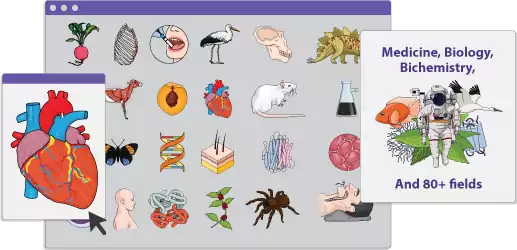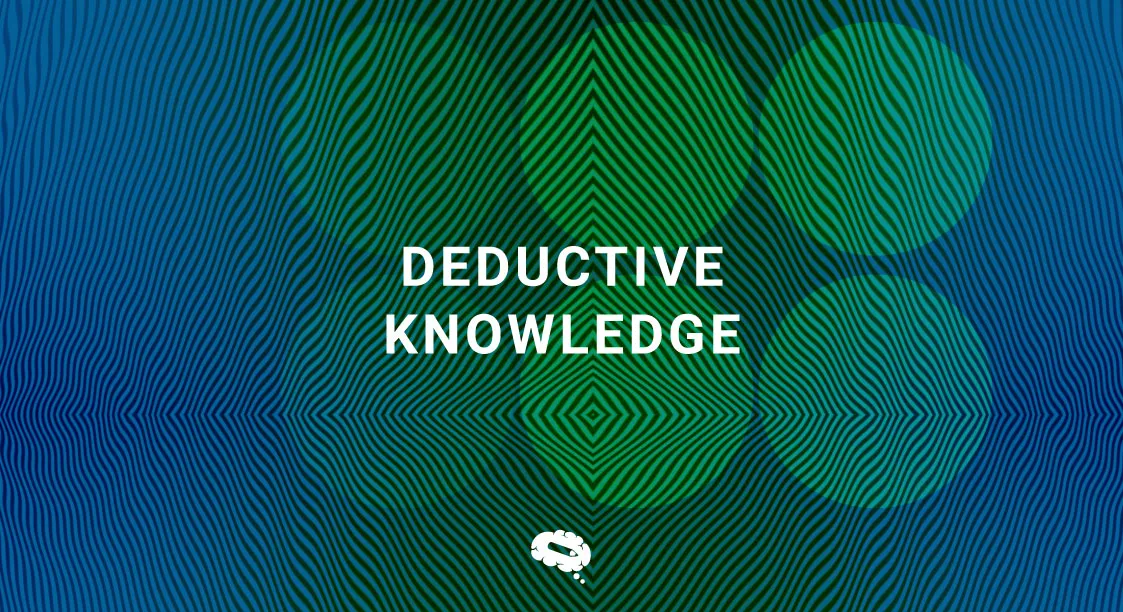Deduktiv kunnskap danner grunnlaget for logiske resonnementer, og gjør det mulig for oss å trekke konklusjoner fra etablerte prinsipper og kjente fakta. Når du tar utgangspunkt i en generell idé eller et prinsipp og anvender det på spesifikke situasjoner for å komme frem til en konklusjon, bruker du deduktivt resonnement.
For example, if you know that “all humans are mortal” and “Socrates is a human,” you can deduce that “Socrates is mortal.” This process begins with a broad statement that is considered true, then applies it to a particular case to get a new, logically sound conclusion.
Høres det forvirrende ut? Ikke bekymre deg. Denne artikkelen vil forklare alt som har med deduktiv kunnskap å gjøre, så sett deg godt til rette og les til slutten for å få vite alt om denne viktige kunnskapen!
Hva er deduktiv kunnskap?
Deductive knowledge is a systematic way of understanding, where conclusions stem from general principles or verified facts using logical reasoning. By mastering deductive knowledge, you can approach problems with confidence, knowing that your conclusions are logically sound and reliable. It’s like building a strong foundation first and then logically constructing a conclusion on top of it.
When you know the starting facts (or premises) are true, deductive reasoning guarantees that your conclusion will also be true. For example, if you know that “all birds have feathers” and “a sparrow is a bird,” you can conclude that “a sparrow has feathers.”
Denne typen resonnementer står ofte i kontrast til induktiv resonneringDet deduktive resonnementet tar utgangspunkt i konkrete eksempler og leter etter en generell regel. Mens induktive resonnementer kan være sannsynlige, er deduktive resonnementer mer pålitelige og sikre, så lenge de opprinnelige premissene er sanne.
Kjennetegn
Deduktiv kunnskap har noen viktige kjennetegn. For det første er den basert på logikk. Du bruker fakta eller premisser som du allerede vet er sanne, og anvender dem på en logisk måte for å komme frem til en konklusjon.
Second, it’s about certainty. Since deductive reasoning is based on true premises, the conclusion must also be true. There’s no guesswork involved, which makes this type of reasoning very powerful in subjects like mathematics, where exact answers are needed.

For det tredje er deduktiv kunnskap enkel. Deduksjonsprosessen beveger seg i én retning: fra det generelle til det spesifikke. Så lenge logikken følges på riktig måte, kan du stole på resultatet.
Ved å bruke deduktiv kunnskap oppnår du sikkerhet og trygghet i konklusjonene dine, noe som gjør det til et viktig verktøy for beslutningstaking og problemløsning.
The Process of Deductive Reasoning – How Deductive Knowledge Shapes Logical Thinking
Forutsetninger og konklusjon
Kjernen i deduktiv kunnskap er prosessen med å resonnere fra sanne premisser til sikre konklusjoner, som danner grunnlaget for logiske beslutninger. Ut fra disse premissene trekker du så en konklusjon.
The structure is simple: if the premises are true and the logic is followed correctly, the conclusion must also be true. Think of it as connecting dots—each premise is a dot, and when you link them logically, you reach the conclusion.
Here’s an example of a simple deductive argument:
- Alle pattedyr har lunger (premiss 1).
- En hval er et pattedyr (premiss 2).
- Derfor har en hval lunger (konklusjon).
Så lenge premissene er sanne, vil konklusjonen følge logisk.
Gyldighet og soliditet
In deductive reasoning, two important terms are validity and soundness. Validity refers to the logical structure of the argument. An argument is valid if the conclusion logically follows from the premises, even if the premises aren’t actually true.
For example, if you say, “All cars are blue, and my vehicle is a car, so my car is blue,” the argument is valid because the conclusion follows logically. However, the premises might not be true.
At argumentet er holdbart betyr at det ikke bare er gyldig, men at premissene også er sanne. Et holdbart argument garanterer en sann konklusjon. I eksemplet med hvalene i forrige avsnitt: Hvis begge premissene (pattedyr har lunger og hvaler er pattedyr) er sanne, er også konklusjonen (hvaler har lunger) sann, noe som gjør argumentet både gyldig og holdbart.
Using valid and sound arguments is crucial because they ensure you’re drawing correct and reliable conclusions from the information you have. This helps you make better decisions and solve problems logically.
Anvendelser av deduktiv kunnskap i den virkelige verden

I hverdagen
Deductive knowledge plays a significant role in daily decision-making, helping us draw logical conclusions from established facts. For example, if you know that “all stores close at 8pm” and it’s 7:30 p.m., you can deduce that you still have time to visit the store before it closes.
Et annet vanlig scenario er å planlegge dagen din. Hvis du vet at du har et møte kl. 10.00 og at det tar 30 minutter å komme dit, kan du slutte deg til at du må dra kl. 09.30. Deduktiv resonnering hjelper deg med å ta logiske beslutninger basert på fakta du allerede kjenner til, slik at du unngår feil og holder deg organisert.
Den største fordelen med å bruke deduksjon i beslutningsprosesser er sikkerheten det gir. Siden konklusjonene følger logisk av sanne premisser, kan du være trygg på at beslutningene dine er fornuftige, noe som kan spare deg for tid og redusere stresset når du skal ta valg i hverdagen.
I vitenskap og matematikk
Deductive reasoning plays a crucial role in scientific discovery and mathematical problem-solving. In science, researchers often begin with a general theory or law and apply it to specific situations. For example, if it’s a well-established scientific fact that “all metals expand when heated,” you can deduce that a copper wire will expand if it is heated.
I matematikken er deduktive resonnementer grunnlaget for bevis og teoremer. Et klassisk eksempel er Pytagoras' læresetning, som sier at i en rettvinklet trekant er kvadratet på hypotenusen lik summen av kvadratene på de to andre sidene. Matematikere beviser denne setningen ved hjelp av logiske trinn, der de tar utgangspunkt i kjente prinsipper og bruker deduksjon.
Ved å bruke deduktive resonnementer i naturvitenskap og matematikk kan du løse problemer med presisjon og sikre at konklusjonene dine er nøyaktige, noe som er essensielt på disse feltene.
Fordeler og utfordringer ved bruk av deduktiv kunnskap
Fordeler
Deduktiv kunnskap gir klarhet og sikkerhet, noe som gjør den til et verdifullt verktøy på områder som krever presisjon, for eksempel matematikk og naturvitenskap. En av de viktigste fordelene er vissheten den gir.
Når du starter med sanne premisser og bruker korrekt logikk, kan du være sikker på at konklusjonen også er sann. Dette er spesielt nyttig innen fagområder som matematikk, juss og naturvitenskap, der presisjon og nøyaktighet er avgjørende.
En annen styrke ved deduktive resonnementer er klarheten. Det fungerer godt i situasjoner der reglene eller prinsippene allerede er etablert.
For example, if you know that “all birds have feathers” and “a robin is a bird,” deduction gives you a clear answer: “a robin has feathers.” In these cases, deduction helps you reach logical and reliable conclusions without needing additional information.
Begrensninger
However, deductive reasoning does have limitations. One major drawback is that it relies heavily on the truth of the premises. If your starting premises are incorrect or incomplete, the conclusion will also be flawed.
For example, if you incorrectly assume that “all fruits are sweet” and then conclude that “a lemon is sweet because it’s a fruit,” your deduction is wrong because the initial premise is false.
Deductive reasoning can also be inflexible compared to inductive reasoning. While deduction starts with general principles and moves to specific conclusions, inductive reasoning works in the opposite way—starting with specific observations to form a general rule. Inductive reasoning is more flexible because it allows you to adjust your conclusions as new evidence or information becomes available.
In contrast, deductive reasoning requires fixed premises, which can limit its usefulness in more complex or uncertain situations where not all facts are known.
Når du forstår både fordelene og begrensningene ved deduktive resonnementer, kan du bruke dem på en klok måte i ulike sammenhenger.
Deduktive resonnementer gir klare, logiske konklusjoner når de er basert på sanne premisser, noe som gjør dem svært pålitelige på områder som matematikk og naturvitenskap. Det gir sikkerhet og presisjon, og hjelper deg med å ta gode beslutninger i hverdagen.
Den kan imidlertid være ufleksibel og begrenset av nøyaktigheten i premissene. Ved å forstå deduksjonens styrker og svakheter kan du bruke den effektivt, samtidig som du vet når andre metoder, som induktive resonnementer, kan være mer hensiktsmessige.
Visualisering av deduktiv kunnskap med Mind the Graph
Deductive knowledge often involves abstract reasoning, but presenting these concepts effectively requires clear visuals. Mind the Graph gjør det mulig for forskere og undervisere å lage overbevisende infografikk og diagrammer som gjør komplekse logiske ideer tilgjengelige. Enten det gjelder undervisning, presentasjoner eller publikasjoner, sørger plattformen vår for at den deduktive kunnskapen din blir formidlet med presisjon og klarhet. Utforsk verktøyene våre i dag for å gi liv til resonnementene dine.


Abonner på nyhetsbrevet vårt
Eksklusivt innhold av høy kvalitet om effektiv visuell
kommunikasjon innen vitenskap.

